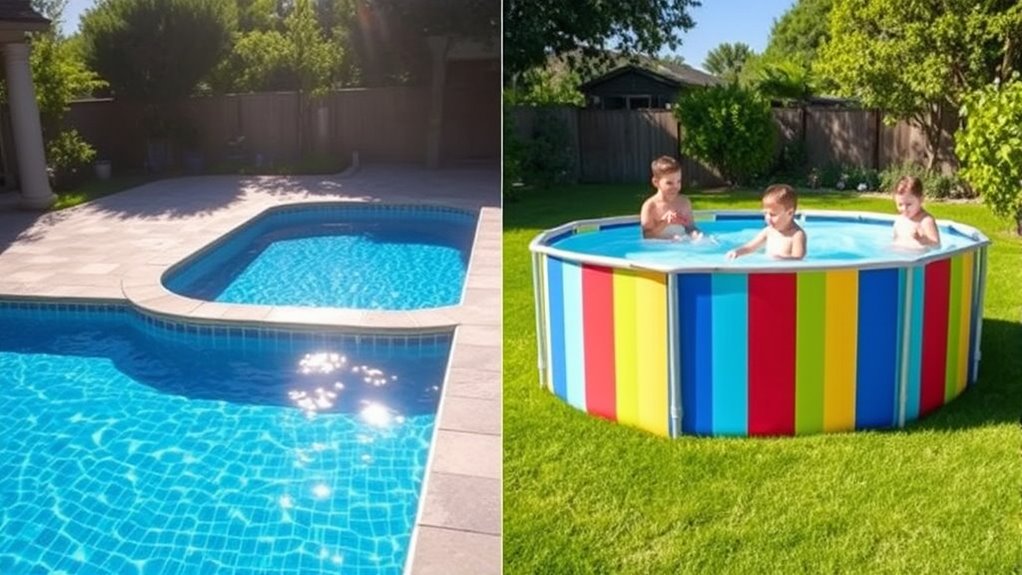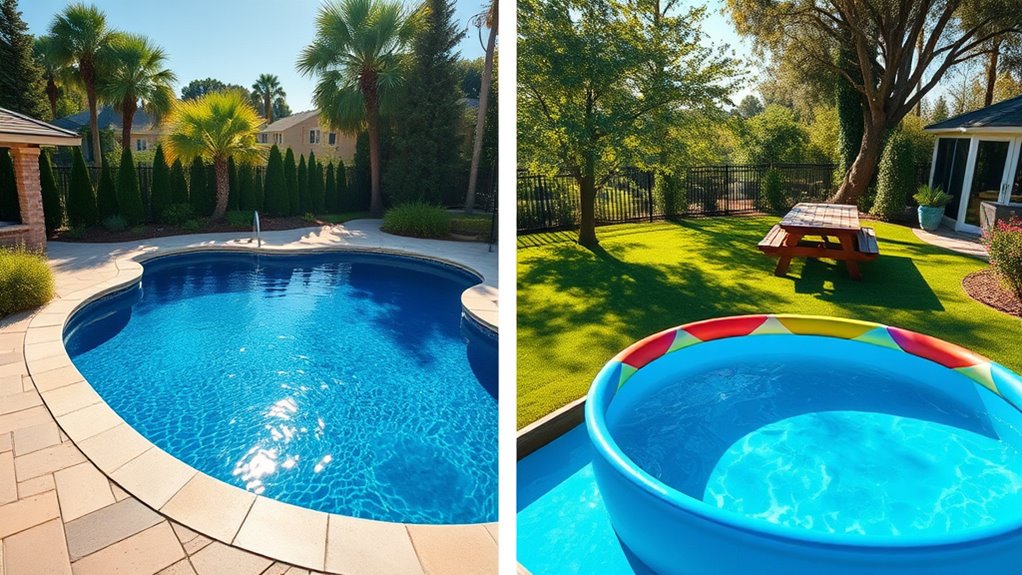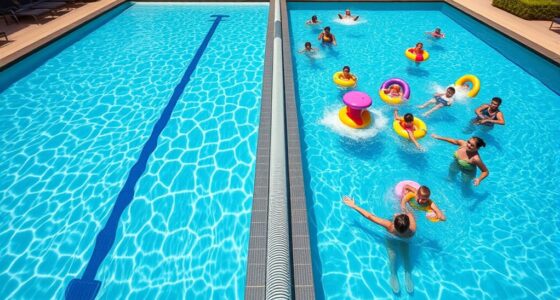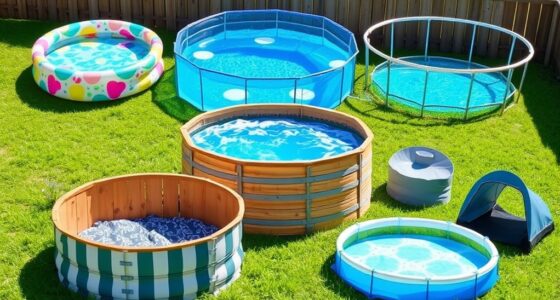Choosing between an inground and above ground pool depends on your budget, safety priorities, and maintenance preferences. Inground pools last longer, are highly customizable, and can increase your property value, but they come with higher costs and maintenance. Above ground pools are more affordable, easier to install, and safer for kids, making them great for short-term or budget-conscious families. To find out which option fits your family’s lifestyle perfectly, explore the details below.
Key Takeaways
- Inground pools offer durability and customization but involve higher costs and longer installation times.
- Above ground pools are more affordable, easier to install, and suitable for shorter-term or seasonal use.
- Inground pools typically require extensive maintenance and safety features, while above ground pools are simpler to manage.
- Consider your safety needs: inground pools often have fences and alarms, whereas above ground pools are shallower and safer for children.
- Your decision should align with your budget, maintenance willingness, safety priorities, and long-term or temporary use plans.

When deciding between inground and above ground pools, understanding their key differences can help you make the right choice for your backyard. One of the most important factors to consider is pool maintenance. Inground pools often require more extensive upkeep because they are larger and have more complex systems, including filters, pumps, and plumbing. You’ll need to regularly test and balance the water chemistry to prevent algae growth and ensure clarity. Additionally, the liner or surface may need periodic repairs or replacements, which can be costly and time-consuming. Above ground pools, on the other hand, are generally simpler to maintain. They usually come with easy-to-use filtration systems and require less frequent chemical adjustments. Their smaller size makes routine cleaning easier and less labor-intensive, which can save you time and money in the long run. Proper maintenance also extends the lifespan of your pool and helps prevent costly repairs down the line.
Inground pools need more maintenance; above ground pools are easier and less time-consuming to care for.
Pool safety is another critical aspect to weigh in your decision. Inground pools often have features like fencing, alarms, and covers built for safety, but they also pose safety risks if not properly secured or supervised. The depth of an inground pool can vary, and deeper sections can be dangerous for young children or inexperienced swimmers. You might need to invest in additional safety equipment or barriers to keep everyone safe. Above ground pools tend to be safer in that regard because they are typically shallower and easier to supervise. Their above-surface design makes it easier to install safety fences and covers, reducing the risk of accidental falls or drownings. However, since they are more portable, they might be less secure if you don’t take proper precautions.
Durability and longevity are also essential considerations. Inground pools are built with sturdy materials like concrete, vinyl, or fiberglass, and when well-maintained, they can last 20 years or more. They add significant value to your property and can be customized to fit your backyard’s landscape. Above ground pools, while more affordable and quicker to install, usually have a lifespan of around 10 years. They can be moved or disassembled, which offers flexibility if you plan to change your yard or relocate. But keep in mind that their surfaces and walls are more susceptible to weather damage and wear over time. The material quality of the pool influences its overall durability and performance.
Ultimately, choosing between inground and above ground pools depends on your budget, maintenance preferences, safety concerns, and how long you want the pool to last. Both options have their advantages and challenges, but understanding these key differences can guide you toward a decision that best fits your family’s needs and ensures a safe, enjoyable backyard retreat.
Frequently Asked Questions
How Do Maintenance Costs Compare Between Inground and Above Ground Pools?
Imagine your pool shimmering under the sun, but you want to keep it pristine without breaking the bank. Inground pools generally have higher maintenance costs, including pool repair costs and more frequent pool cleaning, due to their complexity. Above ground pools often cost less to maintain, with simpler upkeep and fewer repairs needed. You’ll find that the ongoing expenses for above ground pools tend to be lower, making them easier on your budget.
Which Pool Type Offers Better Safety Features for Children?
You should prioritize safety features like pool cover safety and fencing requirements. Above ground pools often have built-in fencing and easy-to-install covers, making them safer for children. Inground pools may require additional fencing and safety barriers to meet safety standards. Always guarantee that you install secure fencing and use pool covers when not in use. These features help prevent accidents and provide peace of mind for your family’s safety around the pool.
Can I Install a Hot Tub in Either Pool Type?
You can install a hot tub with either pool type, but hot tub compatibility depends on your space and existing pool setup. Above ground pools often have fewer pool installation constraints, making it easier to add a hot tub nearby. Inground pools might require more planning and structural adjustments. Check local regulations and consult a professional to guarantee proper installation and safety, regardless of your pool type.
How Do Seasonal Weather Changes Affect Each Pool Type?
Seasonal weather changes impact both pool types through climate adaptability and seasonal maintenance. You’ll need to winterize inground pools to prevent freeze damage, which involves draining water and insulating equipment. Above ground pools are more flexible, as you can disassemble them or drain water during cold months. Regularly checking and adjusting chemical levels, along with winterizing, guarantees both pools stay in good shape despite seasonal weather shifts.
Are There Any Zoning or Permit Restrictions for Inground Pools?
Before installing an inground pool, you should check local zoning regulations and permit requirements. Zoning rules might restrict pool placement, size, or safety features, while permit requirements guarantee your project meets safety standards. You’ll want to contact city or county offices to clarify restrictions and secure necessary permits before you dig. Doing your due diligence helps avoid costly fines or delays, making your pool project smooth and stress-free.
Conclusion
Ultimately, whether you choose an inground or above ground pool, it’s like finding the perfect fit for your family’s summer fun. Sometimes, the best moments happen unexpectedly—like a spontaneous splash or a sunny day that turns into a backyard adventure. Whichever you pick, remember that the memories you create will be the real treasure. So, trust your instincts, embrace the coincidence of those perfect pool days, and plunge into your next great family story.










